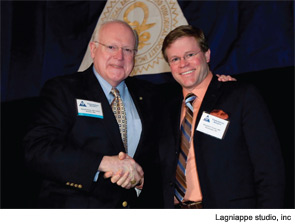
In real estate, it’s location, location, location. In research, it’s grants, grants, grants.
And for otolaryngologists looking to balance the rigors of research with the realities of clinical responsibility, there is never enough money to go around. A pair of awards from the Triological Society, one cosponsored by the American College of Surgeons (ACS), helps bridge the gap. The society, which has awarded nearly $3 million in grants since 1994, gave two new Clinical Scientist Development Awards last fall to provide $80,000 per year for up to five years to physicians already awarded a National Institutes of Health (NIH) Mentored Clinical Scientist Development Award (K08/K23). And the Society is accepting applications for the next round of Triological Society/ACS awards through May 5. (Visit triological.org/researchgrants.htm to apply.)
ENT Today recently talked to the two new awardees.
Benjamin Crane, MD, PhD, Triological Clinical Scientist Development Award
Title: Assistant professor of otolaryngology, University of Rochester, Rochester, N.Y.
Research: Dr. Crane’s research aims to characterize human motion perception as mediated by vision, the vestibular system and the intersection of the two. Dr. Crane is board certified in otolaryngology and neurotology and said the research would help otolaryngologists identify the pathophysiology of dizziness.
Question: What sparked your research into vertigo and vestibular disorders?
Answer: I came into medical school at [the University of California, Los Angeles] from a bioengineering background. I knew I was going to do both an MD and a PhD and wanted to apply engineering principles to biologic problems. I came upon a lab out there that was studying the vestibular control of eye movement. This was something that engineering principles can be applied to and something that was also very patient oriented. That really just took off for me.
Q: Is it difficult to balance research and clinical duties, even with the grant funding?
A: There’s always going to be more patients out there that want to be seen. It’s hard to draw the line sometimes in saying I really need to spend the time on the research when the clinical problems always tend to be more urgent when you have a real patient there. The problem in research is [the thought that] ‘I can always pursue this next week’; it’s easy to put that off too far.
Q: What advice do you have for early-career clinical scientists pursuing their own grants, their own labs and their own research?
A: The key is to spend the time you need in training. The tendency is to want to hurry through training and just get out there, but once you do that, some people find that they don’t have the tools they need…they don’t know how to design a study and how to apply for a grant.
The problem is that once you get to the level where you’re an academic…you’ve got to figure out how you’re going to pay for it. And if it’s going to take you a long time figuring out what you’re doing before you’re even going to apply for grants, most people aren’t going to be interested in supporting you to do that, especially when the success rate in getting grants is pretty low right now.
Titles: Assistant professor, division of otology, neurotology, skull base surgery and department of epidemiology, Johns Hopkins School of Medicine and Bloomberg School of Public Health; core faculty, Johns Hopkins Center on Aging and Health, Baltimore
Research: Dr. Lin’s research analyzes the effects of hearing loss on the cognitive, physical and social functioning of older adults and the role of therapeutic modalities in potentially mitigating these effects. He plans to study how cochlear implants, hearing aids and other rehabilitative modalities can help patients. Eventually, he wants to establish a center for hearing outcomes research at Johns Hopkins.
Q: Your residency work involved hearing loss in children with cochlear implants. How did a pediatric focus turn to older patients?
A: No one is going to argue if you say that hearing loss in kids is detrimental given that it can affect a child’s development. As I cast around a couple of years ago thinking about what kind of research project I wanted to start my academic career with, I talked to a lot of people. One person in particular I talked to said to me, “Hearing loss in kids is a closed book. What you really need to look at is hearing loss in older adults, which is basically completely overlooked.” As I started researching this idea, I realized that although hearing loss is often perceived as being an inconsequential part of aging, this perception is actually not rooted in any scientific evidence, because nobody’s ever studied it before.
Q: How daunting is it to tackle a research area with little historical analysis?
A: It’s tremendously exciting in a way. There are not many people operating in my same field because I’m working at the interface of audiology, otolaryngology, gerontology and public health. It’s exciting because since there really hasn’t been much research done in this area, there are a lot of opportunities to make some very quick advances. But it’s daunting in the sense that I feel like I’m at the very tip of an iceberg and there’s a lot more to do.
Q: These are competitive grant processes. What kind of honor is it to be awarded the financing?
A: It’s absolutely fantastic, especially in today’s funding climate, where research funds are getting increasingly scarce. It’s an incredible honor to be considered by my peers as well as the people at the top of the field as being worthy to have this investment put into developing my academic career.

Leave a Reply